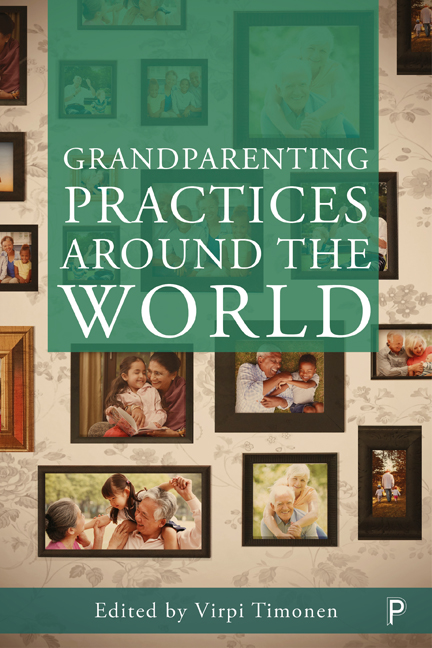Book contents
- Frontmatter
- Contents
- List of figures and tables
- List of abbreviations
- Notes on contributors
- one Introduction: widening the lens on grandparenting
- PART 1 The demographic and welfare-state contexts of grandparenting
- PART 2 Grandparenting in contexts of economic and societal development
- PART 3 Transnational grandparenting
- PART 4 Gender, intersectionalities and grandparenting
- PART 5 Grandparental roles, agency and influence
- Index
thirteen - “I am not that type of grandmother”: (non)compliance with the grandmother archetype among contemporary Czech grandmothers
Published online by Cambridge University Press: 22 April 2022
- Frontmatter
- Contents
- List of figures and tables
- List of abbreviations
- Notes on contributors
- one Introduction: widening the lens on grandparenting
- PART 1 The demographic and welfare-state contexts of grandparenting
- PART 2 Grandparenting in contexts of economic and societal development
- PART 3 Transnational grandparenting
- PART 4 Gender, intersectionalities and grandparenting
- PART 5 Grandparental roles, agency and influence
- Index
Summary
Introduction
In many cultures, historical archetypes continue to influence modern understandings of the grandmother role. The lived experience, social structures, institutional framing and cultural images of grandmotherhood are highly relevant for social scientific examination and for understanding the changing and diverse phenomenon of grandparenting. These aspects dynamically overlap, and the overlaps or contrasts they produce have considerable impact on how people perceive themselves and how they co-construct their identity and self-understanding as a grandparent.
We go about our daily lives with omnipresent archetypes. We are in close contact with them from our early childhood; we learn about them from legends and myths, from fairy tales as well as from daily talk. Archetypes live in the stories we tell and form a vivid part of our cultures. As Snowden (2001, p 1) recounts:
As people tell and retell stories about their environment, their beliefs and values as expressed through the characters within those stories gradually become more and more extreme, until each character individually represents one aspect of that culture, and collectively the characters and the stories that reveal those characters provide a profound set of cultural indicators.
The nature of archetypes also points to their relative durability in time – they transmit values, social norms and cultural codes within and between generations via written and narrated accounts. In many cultures, the historical archetype of the grandmother continues to influence modern understandings of the grandparent role (Meier, 2017; Troyansky, 2016).
In this chapter, we introduce the Grandmother, a true archetype: heroine and saint; symbol of cherishing love, kindness and tenderness, and of national pride. A person, an inspiration, a legend, a cultural legacy; this is the Grandmother portrayed in the Czech book written in 1855 by the female author Božena Němcová. There are few books from that era that would still be on obligatory school reading lists today, and even fewer fictional characters of that time would be visible in our modern culture. But the Grandmother figure seems to reappear persistently, reintroduced by socialisation processes, educational systems, cultural artefacts, public media channels and, last but not least, by various accounts of lay actors in the Czech Republic.
- Type
- Chapter
- Information
- Grandparenting Practices around the World , pp. 253 - 270Publisher: Bristol University PressPrint publication year: 2018



